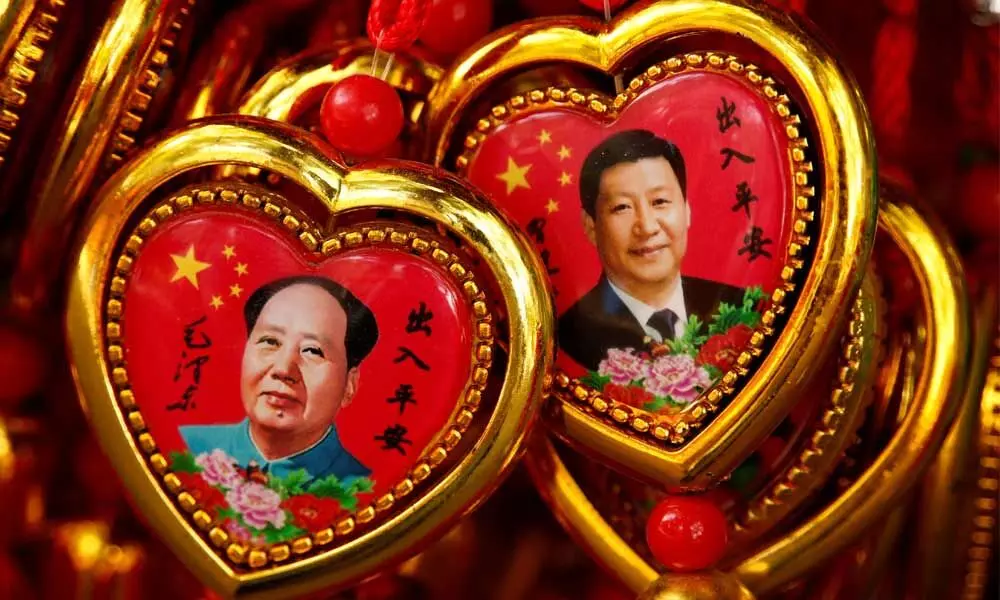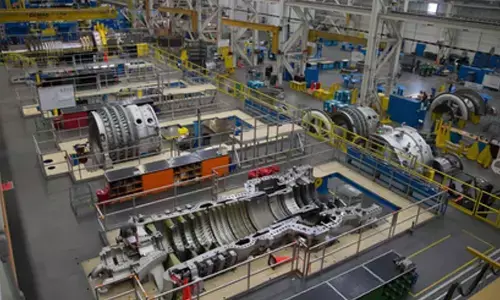CCP has digitised its dictatorship

CCP has digitised its dictatorship
Having unveiled its ambition of emerging as the top Artificial Intelligence (AI) superpower by 2030, the Chinese Communist Party (CCP) has taken rapid strides in digitising every conceivable sphere of its activity, so much so even its dictatorial form of governance
Having unveiled its ambition of emerging as the top Artificial Intelligence (AI) superpower by 2030, the Chinese Communist Party (CCP) has taken rapid strides in digitising every conceivable sphere of its activity, so much so even its dictatorial form of governance. With CCP ideology pervading the state-run and data driven Chinese economy, it is but natural that giant Chinese tech companies and foreign companies with significant presence in China, have been arm twisted by CCP into sharing sensitive consumer data.
This helps the CCP to maintain an eagle eye vigil on its 1.4 billion citizenry through installation of a humongous number of surveillance devices throughout the country, implementation of the dubious Social Credit System and using digital media to indoctrinate people to its ideology while crushing any form of dissent within the country. The story of CCP's transformation from a traditionally repressive dictatorship since inception to the digital dictatorship of President Xi Jinping needs careful study, especially to safeguard nations from the pitfalls of the CCP's irredentist ambitions.
Historically in 1949, Mao Zedong had proclaimed the foundation of the People's Republic of China (PRC), a single party state controlled by the Communist Party of China (CPC). He remained in power till his death in 1976, during which he slowly consolidated his control through suppression of landlords, targeting political opponents and capitalists with the 'Three-anti' and 'Five-anti' campaigns, enforcing his vision of a planned economy, purging rightists within the CPC and bringing in the infamous 'Cultural Revolution' to remove counter-revolutionary elements in a violent 10-year class struggle. While Chairman Mao set China on the path of growth and industrialisation, his regime will always be remembered as being 'autocratic' and 'totalitarian' and it had a terrible dark side, of bringing about mass repression and millions of deaths through starvation, persecution, prison labour and mass executions.
Fast forwarding to more recent times, Xi's rise from being the Party Chief of the Zhejiang province of the Communist Party from 2002-2007 to his appointment as Vice President in 2008 to elevation as President in 2012, has been meteoric. By 2013, in true dictatorial style, Xi acquired all three leadership roles in China -- General Secretary of the Communist Party of China, Chairman of the Central Military Commission and President of the People's Republic of China. The first major policy introduced by Xi in 2013 was a far reaching anti-corruption policy against high ranking officials and local civil servants.
What really cemented his dictatorship was promulgation of CCP's official Political doctrine in 2018 called 'Xi Jinping Thought', which strengthened power at three levels namely, the nation, the CCP and Xi himself. If that was not enough, the National People's Congress (NPC) on December 26, 2020, amended the National Defence Law (NDL) expanding the power of its armed forces headed by Xi to mobilise military and civilian resources to defend its national interests both at home and abroad. 'Disruption' and protection of 'development interests' has been added as grounds for mobilising and deploying troops and reserve forces. Such sweeping powers with a life long tenure give Xi a dictator's stature which even surpasses the Dictatorship of Chairman Mao.
In his first year as President, Xi announced the CCP's ambitious One Belt One Road (OBOR) Project, only to rename it as the Belt and Road Initiative (BRI) a few years later based on feedback from participating countries that the term OBOR sounded too authoritarian. The vision articulated by the CCP for the more inclusive sounding BRI was to undertake infrastructure development and investment in over 70 countries across the continents of Asia, Africa and Europe with likely investment of about $1.3 trillion over the next 10 years. This was followed in 2017 by the release of Xi's 'New Generation Artificial Intelligence Development Plan', which outlines development of a domestic AI industry worth $150 billion in the next few years and to emerge as the leading AI power by 2030. Such is the importance accorded to AI by the CCP, that it has also been included as a national priority in the 'Xi Jinping Thought'. Therefore, the CCP's quest of achieving world dominance in AI perfectly complements the BRI. China has already invested about $22 billion in the semi-conductor industry which makes chips to power AI systems. It is predicted that China's share in the AI market is likely to expand to about $50 billion by 2022 with raw material sourced from BRI countries.
In reality, AI has given rise to intensified societal surveillance and a clampdown on free expression. A shocking and chilling use of AI has been to quell the Uyghur-Han Chinese clashes in the north western autonomous Xinjiang province, which has caused widespread unrest. The CCP has used AI to incarcerate without trial over one million Uyghurs and other Muslim minority ethnic groups in 're-education camps' also referred to as Vocational Education and Training Centers, much like those in existence during Chairman Mao's 'Cultural Revolution'. Surveillance cameras, Facial Recognition software etc. have effectively been used to segregate, track and restrict the freedom of the Turkish Muslim minority in Xinjiang.
The same AI tools are also used to monitor the lives of innocent Chinese citizens through data mining of giant companies. CCP's intelligence agencies regularly use the data processing capabilities of private companies such as Alibaba, Tencents, Huawei, Bytedance, Baidu, ZTE etc. to derive actionable
intelligence in quick time. This arrangement obviates duplication of expensive data-processing functions by CCP's Intelligence agencies. CCP has given legitimacy to this practice by enacting the Internet Security Law in 2017, which mandates all data collected in China to be stored within the country and bans transfer of data across the border without approval. It also mandates web based businesses to share data which may affect the 'security of the nation', which grossly violates privacy of individuals.
The Social Credit System introduced by CCP ostensibly aims to standardise the assessment of economic and social reputation of citizens and businesses. It goes without saying that the Social Credit System would reward pro-CCP activities and restrict the freedom to travel and also social liberties of the so called dissenting voices. It is due to this digital totalism that despite poor handling of the Covid-19 pandemic by the CCP administration, only highly sanitised reports came out from China.
The CCP Dictatorship has not restricted itself to using these 'virtues' of Digital Authoritarianism on its own citizens. Two recent global examples of adverse effects of Chinese AI systems can be seen in Zimbabwe and the Philippines. In Zimbabwe, Hikvision's facial recognition technology has been used for border security purposes and for creation of surveillance cameras enabled smart cities.
The Chinese firm CloudWalk Technology, sanctioned by the US government for its human rights abuse against the Uyghur community, has also developed a facial recognition system for the Zimbabwean government. Similarly, the Philippines launched the 'Safe Philippines' project at Manila under which about 12000 surveillance cameras using AI tools would be installed in partnership with the Chinese companies Huewei and CITCC, with an amount of about US $ 400 Million borrowed from the CCP government. Today, it is estimated that at least 18 countries are developing mass surveillance systems with CCP's assistance. Embracing the CCP AI Model could well mean the end of democracy and the rise of dictatorship in these countries.
One can only imagine the enormous destructive potential of the debt trap scheme of BRI coupled with the sinister facet of CCP AI dominance. We thus have a brilliantly conceived formula for modern day colonisation of weak democracies through Digital Dictatorship...and all this achieved without having to fire a single gunshot let alone fight a war!!! The only counter to this is to develop a democratic digital model which will, while enhancing security, still preserve the privacy and human rights of individuals and safeguard the sovereignty of nations.
(Binay Kumar Singh is an author and columnist)

















